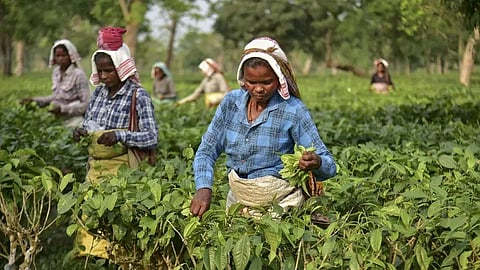
- Home
- Live Blog
- Breaking News
- Top Headlines
- Cities
- NE News
- Sentinel Media
- Sports
- Education
- Jobs

Guwahati: The state Agriculture Department is going to ban the sale and use of the pesticide Acetamiprid 20% SP for tea growers in the state. The central government does not allow Acetamiprid to be used in tea plantations, but it is being used for this purpose in Assam.
The presence of pesticide residues is the bone of contention between the small tea growers (STGs) and the bought leaf factories (BLFs) in the state. However, of late, the small growers have agreed to reduce the use of pesticides, following which the BLFs have again started purchasing green leaf from the STGs.
Recently, the director of Agriculture has written to the government regarding strict enforcement on the use of Acetamiprid in tea gardens. The letter says that it has been reported that Acetamiprid 20% SP is being used in tea plantations in the state, which is not included in the Plant Protection Code of the Tea Board of India. It can be used only in cotton, chilly, cabbage, paddy, and okra for protection against pests. The director has sought approval from the government to restrict the sale and use of this pesticide.
The director said, “District Agriculture Officers and Sub-divisional Agriculture Officers may be requested to ensure that the use and sale of this pesticide are not allowed on tea plantations. All dealers and retailers are to maintain and submit the stock position of Acetamiprid and the sale register (including the details of the farmer’s name, address, and contact number) to District Agriculture Officers or Insecticide Inspectors.”
This move by the Agriculture Department is being welcomed by the North East Tea Association, and the organization has thanked the government for imposing restrictions on the sale and use of this pesticide. “This action by the government would go a long way in resolving the issue of Food Safety and Standards Authority of India (FSSAI) non-compliance in tea,” the organization stated.
Sources associated with the tea industry said that the use of pesticides in tea plantations is inevitable; otherwise, pests will destroy the tea bushes. The Tea Research Association, Tocklai, and FSSAI have listed some pesticides for use in tea plantations. Obviously, the tea growers will use the listed pesticides on their plantations. Tea growers maintain that it is not possible to make big tea plantations organic.
A senior official of the Industries Department said, “If we want to ensure the survival of the tea industry in Assam, we will have to maintain quality, whether it be a small or big tea plantation. In these times of intense competition, we will not be able to compete in the market if there is pesticide residue in the tea produced here.”
Also Read: All Assam Students' Union slams OIL CMD for ignoring local sentiments
Also Watch: